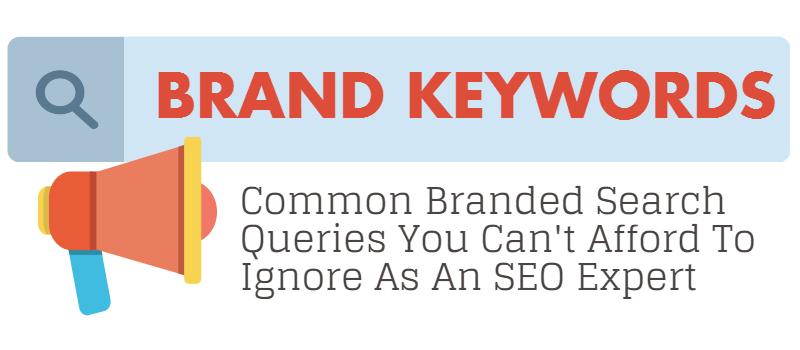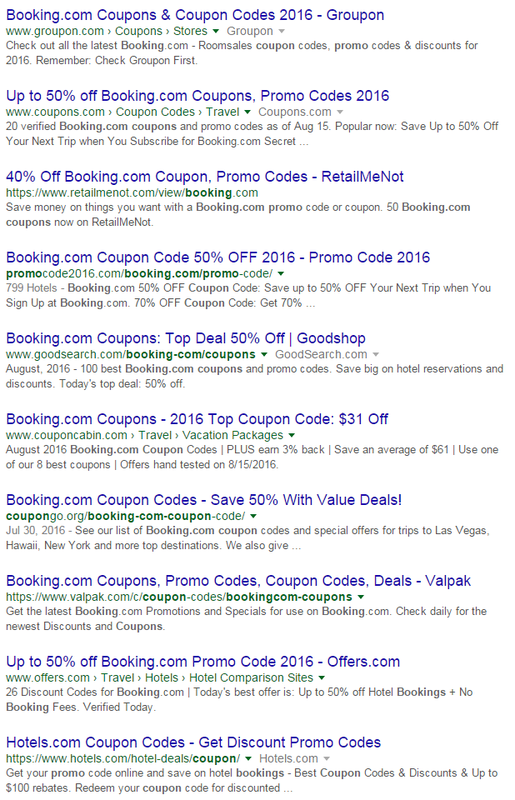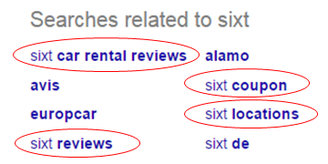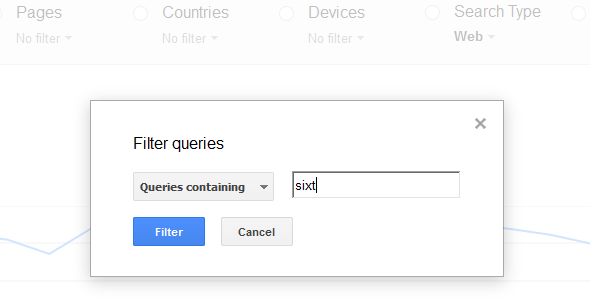Two Types of Brand Keywords You Can't Afford to Ignore
While SEOs all get excited about identifying new keywords and pushing into untapped organic search real estate, one mistake many SEO professionals make is skipping the basics like ensuring that they have pages optimized to rank at the top of the SERPs for longtail brand keywords.
While your homepage probably ranks relatively easily for your brand name, and you may have a nice knowledge graph and expansive list of sitelinks to occupy a lot of organic search real estate for your brand name, there are probably some profitable brand search queries which (if ignored) could be costing your business money and hurting your conversion rate.
Here’s my checklist of a few common brand keyword groups you should be targeting via SEO to boost conversion rate and manage your brand’s reputation on Google.
While your homepage probably ranks relatively easily for your brand name, and you may have a nice knowledge graph and expansive list of sitelinks to occupy a lot of organic search real estate for your brand name, there are probably some profitable brand search queries which (if ignored) could be costing your business money and hurting your conversion rate.
Here’s my checklist of a few common brand keyword groups you should be targeting via SEO to boost conversion rate and manage your brand’s reputation on Google.
Brand Search: Review Keywords
There might not be a better example of a profitable branded query than reviews queries, but you would be surprised by how many brands don’t create a unique page on their site to target people searching for reviews of their brand.
The great part about having a reviews page on your website which ranks well for branded review queries is that you can curate the reviews to feature a handful of real reviews which cast your brand in a favorable light at the top of the page.
If you leave it to chance, not only will you lose out on organic traffic and transactions which you can attribute to organic search (those transactions might come in as referral traffic instead), but you can potentially miss out on transactions because users saw so many negative reviews about your company or brand at the top of the SERPs.
The great part about having a reviews page on your website which ranks well for branded review queries is that you can curate the reviews to feature a handful of real reviews which cast your brand in a favorable light at the top of the page.
If you leave it to chance, not only will you lose out on organic traffic and transactions which you can attribute to organic search (those transactions might come in as referral traffic instead), but you can potentially miss out on transactions because users saw so many negative reviews about your company or brand at the top of the SERPs.
Example: Booking.com
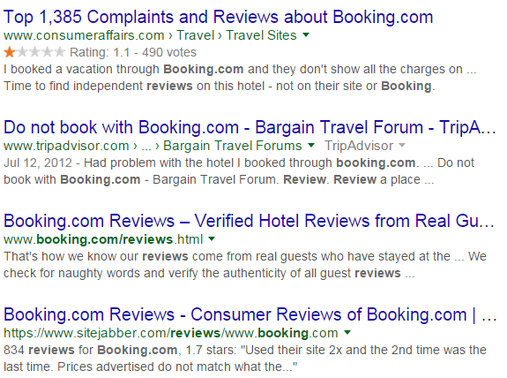
Search “booking.com reviews” and you’ll see that booking.com ranks #3 for this important branded query. The top two results are certainly not flattering … result #1 is from consumeraffairs.com, displaying a 1 star review rich snippet which corresponds to a 1.1 rating based on 490 customer votes. The second result is from TripAdvisor.com and features the meta title “Do not book with booking.com.” Not a great impression for your brand.
Now let’s think about who is searching for booking.com reviews … these are probably people who have already found a hotel they’re interested in booking on booking.com and they are searching for a little more information about the company and the customer service they provide before they submit payment. This branded SERP is probably costing the company a decent number of conversions, especially when you look at the average monthly search volume for the “booking.com reviews” query (5,400 searches per month on google.com).
While Booking.com has created a reviews page to try to rank for branded “review” queries, there are a few steps they could take to try to draw the user’s eye and bring this traffic back to their website where their content team could present curated reviews which serve to counter the brand’s reputation on other sites in the SERP.
One way the site could stand out would be to add schema review or schema aggregate review markup to their review page to try to generate a star rating and review rich snippet in the SERPs. This could help to draw the eye, improve their organic CTR and compete with the rich snippet from consumeraffairs.com to convince people to give the brand a second look.
Now let’s think about who is searching for booking.com reviews … these are probably people who have already found a hotel they’re interested in booking on booking.com and they are searching for a little more information about the company and the customer service they provide before they submit payment. This branded SERP is probably costing the company a decent number of conversions, especially when you look at the average monthly search volume for the “booking.com reviews” query (5,400 searches per month on google.com).
While Booking.com has created a reviews page to try to rank for branded “review” queries, there are a few steps they could take to try to draw the user’s eye and bring this traffic back to their website where their content team could present curated reviews which serve to counter the brand’s reputation on other sites in the SERP.
One way the site could stand out would be to add schema review or schema aggregate review markup to their review page to try to generate a star rating and review rich snippet in the SERPs. This could help to draw the eye, improve their organic CTR and compete with the rich snippet from consumeraffairs.com to convince people to give the brand a second look.
Brand Search Keywords: Deals, Coupons, Promo Codes
Another treasure trove of organic branded traffic in longtail branded queries is in discount code, promo code, and coupon code keywords. If you manage the SEO account for a large brand with an active affiliate program, chances are pretty good that you have some coupon and deal sites which are your best performing affiliates. Why? Because these brands realize the value of swiping commissions from your site’s visitors which are committed to a purchase, but who want to do one last search to see if they can get a slightly better price.
By targeting these branded keywords yourself, you can trim the amount of affiliate commissions you pay out, improving your margins on goods, products and services you sell online. Booking.com again serves as a good example of having a missed organic search opportunity:
By targeting these branded keywords yourself, you can trim the amount of affiliate commissions you pay out, improving your margins on goods, products and services you sell online. Booking.com again serves as a good example of having a missed organic search opportunity:
Example: Booking.com
If you want to get an idea of how much branded organic search traffic booking.com is missing out on by not targeting these coupon and promo code queries, here’s a small sampling of some of their biggest branded queries in this space and the average monthly search volume of each:
And here’s a screenshot of the 10 organic search results which occupy space on the first page for “booking.com coupon” – the largest branded deal/discount query. Notice anything? Booking.com doesn’t even rank on the first page for this term. With sites like coupons.com, promocode2016.com, groupon.com, retailmenot.com and others occupying the prime real estate, it’s safe to say that booking.com is missing out on quite a lot of branded organic search traffic, paying a considerable amount of commissions for hotel bookings they would have gotten anyway. |
3 Ways to Identify Longtail Brand Search Keywords to Target
Here are three easy ways to identify branded queries to target, using Sixt Car Rental as an example.
1. Do a brand search and look at the “related” queries at the bottom of the SERPs. This will usually reveal some of the most frequently searched branded queries.
2. Start typing your brand into Google and look at the autocomplete results to identify some of the most commonly used longtail queries.
3. Look in the Search Analytics section of search console, expand the date range to the last 90 days and filter queries to only display those which contain your brand name.
Not only can you boost the performance of your organic search channel by making sure your site is properly optimized to rank for all of your longtail brand keywords, you will also be sure to offer people searching for information about your brand customized information which is tailored to their search … this will help to ensure that your visitors get the information they need as quickly as possible. The fact that you have the ability to improve your conversion rate and reduce the amount of money you spend on affiliate commissions? Well that’s not bad either.
Related: Tips For Effective On-Page Search Engine Optimization
Related: Tips For Effective On-Page Search Engine Optimization
